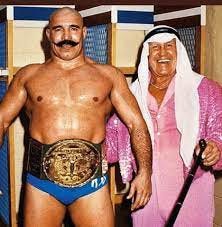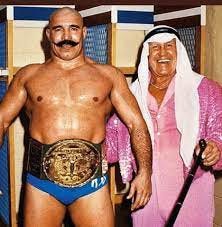What If? Saudi Arabia Bought WWE?
"When you die at the palace, you really die at the palace." - Mel Brooks
Try to imagine a more carny story than this: A boy grows up poor in the rural south, abandoned by his real family and abused by his adoptive one. He finds his real father, who runs a traveling circus and makes a modest fortune. The boy and his father bond and the boy takes over the circus, turning it into one of the world’s most famous and sought after spectacles. In the end, the boy sells his circus to the ruling family of Saudi Arabia, who have been huge fans for decades, and the boy dies among the world’s richest men.
That’s what some claimed happened last week, when journalists on Twitter declared that the WWE would be sold to Saudi Arabia’s Public Wealth Fund, which is one of the largest government sponsored investment funds in the world (assets north of $600 billion) and the piggybank of Saudi Arabia’s ruling family (“Crown Prince” Mohammed bin Salman Al Saud is its chairman and ultimate decision-maker). The WWE, valued at about $6.5 billion, would be a tiny acquisition for such a large fund, we know the WWE is for sale because its management, including majority shareholder Vince McMahon has said so, and we know that WWE runs between 1-3 shows a year in Saudi Arabia, at the request of the royals, and some of the family are wrestling fans.
The reports turned out false, but if anything could happen, this could. It might still happen, who knows? The Fund owns chunks of many American and European companies including Google, Amazon, Facebook, Activision Blizzard and the newly private Twitter. At one point, Saudi “Prince” Al Waleed bin Talal was the largest shareholder of Citigroup.
The Saudi Royal family are nasty people. They oppress their own citizens, wage illegal wars in Yemen and Syria and murdered journalist Jamal Khashoggi for criticizing them. But it’s functionally impossible, as an American or European citizen, to effectively boycott businesses where the Saudi regime has investments, even if you somehow found a way to live without petroleum or its byproducts. Saudi wealth, controlled by its dictators, is everywhere.
It’s much the same way with China. You might have strong feelings about how China’s government treats its people, much less those outside its borders, but commerce has made the choice for us.
So, does it matter if the Saudi royals buy an American pro wrestling and sports entertainment media company? In a lot of ways, no. They own chunks of companies throughout America’s entertainment and media landscape.
But in some ways it does matter. As the ultimate victor in the consolidation of professional wrestling, over many decades, from an industry of small companies, each controlling a region, to one national and international promotion, the WWE owns the content library that is a history of the sport to its earliest, filmmable days. The WWE has been a decent but not great owner of that footage. The right thing to do would have been to have made all of the content available online to anybody who might want to see it, without undo censorship. WWE got close to that but then closed down its own streaming service and partnered with NBC’s Peacock, which has no interest in hosting all wrestling content from all eras, warts and all. The Saudi Royals would probably be a horrible steward of that legacy.
In recent years, the WWE has evolved so that women wrestlers have become attractions rather than cheesecake. How does this fit in with the values espoused by Saudi’s royals?
In terms of corporate behavior, wrestling fans have already forgiven a lot. There have been murders, suicides and premature deaths. It is at least plausible that one of those murders, of Nancy Argento by wrestler Jimmy Snuka in the 1980s, was covered up because WWE oner Vince McMahon interfered with local police on behalf of a man who was, at the time, his biggest star. Maybe fans can’t tolerate a WWE owned by an unrepentant killer or the Saudi royals.
Wrestling in the WWE era has faked its counter-culture credentials. The bad ass Stone Cold Steve Austin who, two decades ago, embodied the blue collar fantasy of whupping the boss’ ass in public was, in reality, a loyal partner to his boss and a model employee. So maybe it doesn’t matter if WWE is owned by an outright, unrepentant dictatorship. But it sure takes a lot of the fun out of the joke.
From the Middlebrow’s perspective, it’s bad enough that Disney was allowed to buy Star Wars and Marvel, monopolizing his childhood memories — and Disney might wind up buying WWE, too? But do we have to allow people clearly guilty of crimes against humanity to do the same?


